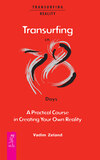Kitabı oku: «Reality Transurfing: steps 1-5», sayfa 10
Releasing feelings of guilt is the most effective way of surviving in an aggressive environment such as a prison, a gang, the army or street. It is with good reason that the unspoken rule: “Trust no one, fear nothing, and ask for nothing” exists in the criminal world. The rule warns against creating excess potential. Guilt lies at the core of all potential that will serve you ill in an aggressive environment. In a world based on the principle of survival of the fittest you can protect yourself by demonstrating your strength but this is sometimes too general an approach. It is much more effective to eliminate the idea of potential punishment from your subconscious. The following situation illustrates what I mean. In the former Soviet Union, political prisoners were intentionally jailed with common criminals as a way of breaking their spirit. What happened was that many political prisoners by virtue of their remarkable qualities not only avoided becoming victims of harassment and abuse; they became chosen authority figures among the harder criminals, demonstrating that personal independence and dignity are valued more highly than physical strength. Many people are strong physically, but strength of character is a rare trait. The key to personal dignity is the absence of guilt. True personal power rests on the ability to remain free of guilt and not on the ability to take someone by the throat.
The famous Russian writer, Anton Pavlovich Chekhov, once said: “Drop by drop I am squeezing the slave out of me.” His phrase highlights his personal dedication to rid the conscience of any feeling of guilt. To get rid of something normally means to fight against it but in the context of Transurfing there is no need to battle or force yourself to do something. In Transurfing it is considered more preferable to renounce i.e., to choose. You do not have to squeeze the feeling of guilt out of yourself. It is enough to live by your own credo. No one has the right to judge you and you have the right to be yourself. If you allow yourself to be you, the need for self-justification will fall away and the fear of being punished will fade. Then, something truly remarkable will happen: no one will dare insult you.
Moreover, wherever you happen to be, in prison, in the army, in a gang, at work, on the street or in a bar, you will never again find yourself in a situation where somebody will threaten you with violence. Others may from time to time, be subject to violence in one form or another, but because you have renounced the feeling of guilt and driven it from your subconscious you will reside on life lines where scripts of punishment simply don’t exist.
Money
It is almost impossible to avoid a dependent relationship on money because it is very hard to love money without wanting more of it. All one can do is attempt to limit the aspect of dependency to a minimum. Be happy if money has come to you but never kill yourself worrying about not having enough money, or spending it, otherwise you will have less and less of it. If a person does not earn much money they probably make the mistake of complaining that they never have enough because the parameters of this type of thought energy correspond to life lines in which there is no wealth.
It is particularly dangerous to give in to an anxiety that your income is gradually decreasing. Fear represents the most energetically intense emotion a human being can experience and so when a person fears losing money or not earning enough money they activate the most effective method there is for shifting to life lines where they really do have less and less money. Freeing oneself from the money trap is difficult but it can be done. First the cause of the excess potential has to be eliminated, which will either be strong dependency on money, or a very intense desire to have money.
Start by accepting and enjoying what you already have. Remember that things could always be worse. You do not have to stop wanting money entirely but you can relax about the fact that it is not rolling in with the force of a gushing river. Take the position of the gambler who could at any moment just as easily hit the jackpot as lose everything.
For pendulums, money is a universal means of rewarding their adherents. It is the activity of pendulums that has led to the widespread idolization of money. Money helps us to provide a good life for ourselves in the material world. Almost anything can be bought and sold. All pendulums use money as payment and there is a hidden danger in this. Having taken the falsely glittering bait it is easy to switch to a life line that lies far away from your true happiness.
In pursuing their own interests, pendulums have created the myth that in order to achieve your goals you have to have money. As a result, people replace their original goal with the artificial substitute of money. Money can be gained from different pendulums and so people shift their focus from the goal to money and come under the influence of a pendulum that is alien to them. People then lose a sense of what they really want from life and focus on the fruitless search for money.
This state of affairs is very profitable for the pendulum but not so profitable for the individual who becomes dependent and loses their way. No-one will ever make a lot of money working for a pendulum that functions outside of the context of their true purpose because they just end up serving someone else’s objective. A lot of people live in exactly this position. This is how the myth arose that wealth is the privilege of the minority. In actual fact anyone can become rich if they serve their own goals.
Money is not the goal nor is it really even the means to reaching the goal. It is simply an accompanying attribute. The goal is what a person really wants in life such as to have their own house and grow roses; travel the world and visit faraway places; catch trout in Alaska; go skiing in the Alps; raise horses on their own farm; enjoy life on their own oceanic island; become a movie star or an artist.
It is true that certain goals can be achieved if you have a sack of money so this is what the majority of people do; they go after that sack. By focusing on the money they put the goal itself on the back burner. According to the principles of Transurfing, this is like trying to get onto a life line where a sack of money awaits but you find it almost impossible to get there because you are working for someone else’s pendulum. In the end, the person loses out both on the money and their own goal because their thought energy is focused on a substitute for their true purpose.
We will return to this issue in the chapter “Goals and Doors”. For now we can draw one general conclusion which is that if you have placed the likelihood of achieving your goal on the condition of getting rich first, drop the condition fast. Let us take an example. If your dream is to travel round the world then obviously this requires a lot of money. To fulfil you dream do not think about the money; keep your thoughts on the original goal. The money will come to you because it is an accompanying attribute to the goal. It is really very simple. It sounds unlikely I know but this is really how things work and soon you will realise that for yourself. In pursuing their own end, pendulums have turned everything upside down. It is not that the goal is achieved with the help of money but rather the money that follows on as you create the path to your goal.
Now you can see just what a powerful influence pendulums have and how many seeds have been sewn for myths and misunderstandings. Listening these lines you may object that it is obvious that first a person becomes a large industrialist or a banker or a film star and then they become a millionaire. It is true that those who become millionaires are those who think not of wealth but of following their own goal. The majority of people think and do the opposite. They either serve someone else’s goal, replacing their own with an artificial substitute, or renounce their own dream entirely because the condition of having to be rich first seems unachievable.
In actual fact there are no limitations to wealth. You can desire anything you want. If it is truly yours to have you will receive it. If the goal has been imposed upon you by a pendulum you will not get anywhere. We will talk about goals in more detail later. I am rushing ahead a little but that is unavoidable because there is not anything else to be said about money. Money is nothing more than an accompanying attribute on the path to your goal. Do not worry about money and it will come to you of its own accord. The most important thing now is to reduce the importance of capital to a minimum so that you do not create excess potential. Think only of the thing you wish to achieve.
At the same time, you should be attentive to money and treat it carefully. If you see a small coin on the street and are too lazy to pick it up, it suggests that you do not respect money at all. The money pendulum will hardly be well disposed towards you if you treat its attributes carelessly.
Neither should you worry about spending money because this is a necessary part of fulfilling your mission. If you have made the decision to spend money on something have no regrets. When you try to save up a handsome sum and spend as little as possible you create strong excess potential because energy has been built up in one place. In this case it is highly likely that you could lose everything. Money should be spent wisely to keep a flow going as potential appears where there is no flow of energy. Wealthy people support charities with good reason as it reduces the excess potential of their accumulated wealth.
Perfection
Finally, we look at the most ambiguous and paradoxical way in which balance is compromised. Things that start small can turn out to have the severest of consequences. Usually, we are taught from childhood to do things carefully; to be thorough and always do our best. We are taught to be responsible and are instilled with a sense of what is right and what is wrong. Undoubtedly, this is how things should be; otherwise the next generation would turn into an entire army of slobs and slackers. The down side to this kind of upbringing is that in some of the pendulum’s adherents the striving for perfection is so deeply instilled that it becomes part of their persona.
Some people become obsessed with perfection as a result of which their life becomes a constant battle. You can guess what they are battling with of course: balanced forces. The need to achieve perfection in everything creates complications on an energetic level because the assessments a perfectionist makes will inevitably be distorted.
There is nothing wrong with always trying to do your best, but if you attribute perfection too much importance, balanced forces will come in and ruin everything. In addition, a kind of vicious circle is created making the person even more immersed in their obsession. The person desires perfection but they get the opposite. Then they try desperately to right everything but that just makes things worse. In the end, striving for perfection becomes a habit, and can even develop into a mania. The idealist has a tendency not only to place high demands on themselves but to expect high standards of others too, which can poison the life of those they are close to. Their high expectations manifest as an intolerance towards other people’s habits and tastes, which often causes small conflicts that easily escalate into bigger ones.
From the outside it is easy to see how ridiculous it is to seek perfection in everything at the same time as tyrannizing everyone else around you. The perfectionist, however, is deeply involved in their role and seduced by the thought that they are impeccable, infallible, in short, perfect. They think that because they strive to meet perfect standards they must be a model for those standards and yet they will not admit this to themselves because generally speaking most perfectionists are too clever not to realize that enjoying a sense of one’s own supremacy does not quite fit with generally accepted notions of perfection. Nonetheless, in a person with these traits, the feeling of being right about everything is deeply rooted in the subconscious.
At this point the perfectionist risks succumbing to the temptation of placing themselves in the position of supreme judge over the rest of humanity and deciding how and what all other lost souls should be doing. Naturally, the perfectionist easily gives in to the temptation because they are motivated by the righteous desire to set everybody on the right path and they have no difficulty in justifying their behaviour because they know that they are always right.
From then onwards, having wrapped themselves in the mantle of “arbiter of fate” they assume the right to judge and condemn other people. In reality, of course, the trial does not go beyond everyday accusations and admonition. However, on an energetic level, powerful excess potential is created. The “judge” takes on the mission of deciding how the foolish ones should act and think, what they should value, what they should believe in and what they should strive for. If some feeble being should suddenly decide that they have a right to their own opinion they will be quickly put in their place. Anyone who dares show any resistance will be judged, sentenced and labelled, just to make it quite clear who is who.
Of course the listener is nothing like the picture of the idealist portrayed here. It is unlikely that a person who believed they were always right would be drawn to listen this book. The perfectionist who feels they know how others should run their lives is free of self-doubt. However, if you meet someone like the perfectionist portrayed here take a good look because here you have an extreme example of how crudely the laws of balance can be disregarded. We are all guests in this world. We have the freedom to choose our own path but no-one has the right to judge others, to sentence them or to label them (with the exception of criminal law).
What starts as an innocent striving for perfection ends in claims to the privileges of master. Accordingly, the resistance exerted by balanced forces which initially takes the form of minor problems increases in intensity. If the idealist is protected by a pendulum they will get away with their behaviour for a while but eventually the time will come when they will have to pay for their deeds. When a guest forgets that they are just a guest, and makes claims to the role of master they run the risk of being thrown out altogether.
Importance
Finally, we will look at the idea of importance as this is the most common cause of excess potential. Importance arises when something is attributed excess meaning. Importance represents excess potential in pure form. In the process of eliminating importance, balanced forces create problems for the person that created it.
Two forms of importance exist, inner and outer. Inner or personal importance represents an overestimation of your own virtues or shortcomings. The formula of inner importance goes along the lines of: “I am an important person” or “I do important work”. When the arrow of perceived personal importance goes right off the scale, balanced forces get involved and the “hot shot” gets a disappointing slap. They will discover that their work is either not needed at all, or that it is done badly. Puffing up your chest and sticking your nose in the air is only one side of the coin. The other side of the coin is excessive modesty and self-deprecation. The reader already knows what this leads to. The amount of excess potential is the same in both cases, the only difference being its positive or negative value.
Outer importance is created when a person attributes huge meaning to an object or event taking place in the external world. In this case the formula goes: “such and such means an awful lot to me” or “it is really important to me to do such and such”. Consequently, excess potential is created and things go wrong. Whereas the feeling of inner importance can be controlled it is much harder to do so with outer importance. Imagine that you have to walk along a plank lying on the ground. Nothing could be easier. Now imagine that you are forced to walk along the same plank which has been placed between the roofs of two high buildings. Walking the plank will have escalated in importance and there will be nothing you can do to persuade yourself otherwise. The only way of eliminating outer importance is to have a safety net. The form the safety net takes will be subjective and depend on each situation. The most important thing is not to place everything on one side of the scales. There has to be some kind of counterbalance, protection or alternative plan.
Essentially everything that can be said about importance has already been said above. There is nothing more to add. You may have made the connection already that in fact everything we have been talking about in this chapter is one variation or another on the theme of importance, inner and outer. All unbalanced feelings and reactions such as indignation, dissatisfaction, irritation, restlessness, anxiety, despondence, embarrassment, despair, fear, remorse, attachment, admiration, exaggerated affection, idealization, worship, delight, disappointment, pride, conceit, contempt, disgust, resentment etc, are all manifestations of importance in one form or another. Excess potential is only created when you attribute excess importance to an object or event that exists inside or outside of yourself.
Projected importance creates excess potential which calls forth the winds of balanced forces. These in turn lead to a mass of different problems and life becomes a battle for survival. Now you can judge for yourself how much inner and outer importance complicates your life.
But that is not all. Remember the puppet strings. Pendulums hook into your feelings and reactions: fear, anxiety, hatred, love, worship, call of duty, guilt etc. As you now know, all these states are as a consequence of projected importance. This is a description of what happens. Imagine an object is standing in front of you. On an energetic level the object is neutral: neither good nor bad. You approach the object, wrap it in importance packaging, step aside to look at it and gasp. Now you have created an attachment to the object you are willing to give the pendulum—your energy. Importance is like the carrot that makes a little donkey obediently plod along behind. A pendulum uses the same carrot to lock onto the frequency of your energy, drain it and then lead you wherever it wants you to go.
To return to a condition of harmony with the rest of the world and free yourself from the burden of the pendulum you have to be able to diminish importance. You have to be able to keep your inner Guardian from dozing off so that it can observe the level of importance you place upon yourself and the world around you. By reducing the level of importance you place on things you immediately re-establish a state of balance. The emptiness (absence of excess potential) gives pendulums nothing to hook onto and consequently, no means of establishing control over you. You may protest that I appear to be suggesting that we all numb ourselves into being lifeless statues. I am in no way urging anyone to reject all emotion or even reduce the intensity of the emotions they experience because, generally, it is futile to fight your emotions. Trying to keep yourself in check and struggling to stay calm on the outside, while everything is bubbling over on the inside just creates more and more excess potential. Emotions stem from attitudes, so rather than fighting your emotions it is more purposeful to change your attitude. Feelings and emotions are simply a consequence of your relationship or attitude to something and that attitude is caused by one thing – importance.
If for example, someone in my family has had a baby, a relative has passed away, or there is a wedding or other family gathering planned, these things are neither important to me nor am I indifferent to them. Do you see the difference? I do not make a problem out of the event or torture myself and those around me with my emotional response. So, what of compassion you may ask. I think I would be correct in saying that compassion and helping those who truly need it never did anyone any harm but it is still important even with compassion to observe how you attribute importance to it. I mentioned helping someone when they really need it but sometimes, people just want to suffer. They enjoy it, and evoking your compassion is just a way of indulging in self-validation at your expense. Or, for example, you see a cripple begging on the street and give them some money but the cripple smirks at you as you move on and it turns out that it is not a cripple at all but a professional beggar.
Importance does not exist in the animal and plant kingdoms like it does in human society, with the exception of pets that so closely identify themselves with humans and adopt aspects of human behaviour. Society affects pets as well it would seem. In the world of the wild behaviour is based on the fulfilment of purpose from the point of view of maintaining the laws of balance. Animal behaviour is purely guided by instinct. Importance is a solely human invention that is enjoyed by pendulums. Any extreme bias of assessment towards outer importance makes a person a fanatic, whilst any extreme bias of assessment towards inner importance makes a person a despot.
From the way I have portrayed reality you may be under the impression that one can hardly take a step without fearing the consequences. Fortunately, things are not that bad. Balanced forces will only noticeably affect your life if you are very strongly attached to your own ideas of how things should be; you are obsessive; or have just gone too far. The role of pendulums is also clear. We all come under their influence. The main thing is to be very aware of the mechanism for control; how they hook into you and how far you will let them go.
Reducing importance does not just significantly eliminate problems from your life. Once you have let go of inner and outer importance you obtain the treasure called freedom of choice. But, I hear you say, according to the primary principle of Transurfing we automatically have freedom of choice. This is true, we do have the freedom of choice, but often we do not know how to use it because balanced forces and pendulums get in the way. By projecting importance our entire lives are spent battling with the actions of balanced forces. There is simply not enough energy left over to make conscious choices or think about what we really want in life. Pendulums go out of their way to gain control and enforce their own ideas. What freedom can there be in this?
All the importance we attribute to things, be it inner or outer is simply a projection. No-one is of any true importance in this world and yet the riches of life are available to us. Children playing happily on the beach, splashing about and having fun in the waves do not think about whether they are good or bad, whether the water is good or bad or whether the other children are good or bad. Whilst the situation remains unchanged, they are simply happy and in harmony with nature. We all came into the world like that, as a child of nature. If a person maintains a state of harmony the best that life has to offer will be available to them but as soon as a person begins to project importance problems arise. People fail to see the causal link between their projections and the problems they experience and so they buy into the idea that the world is a truly hostile place, where it is really hard to get what you want. In fact, the only obstacle on the path to fulfilling your desires is the projection of artificial importance. I may not have managed to convince you so far that this is the truth of things but I have not run out of arguments yet!












